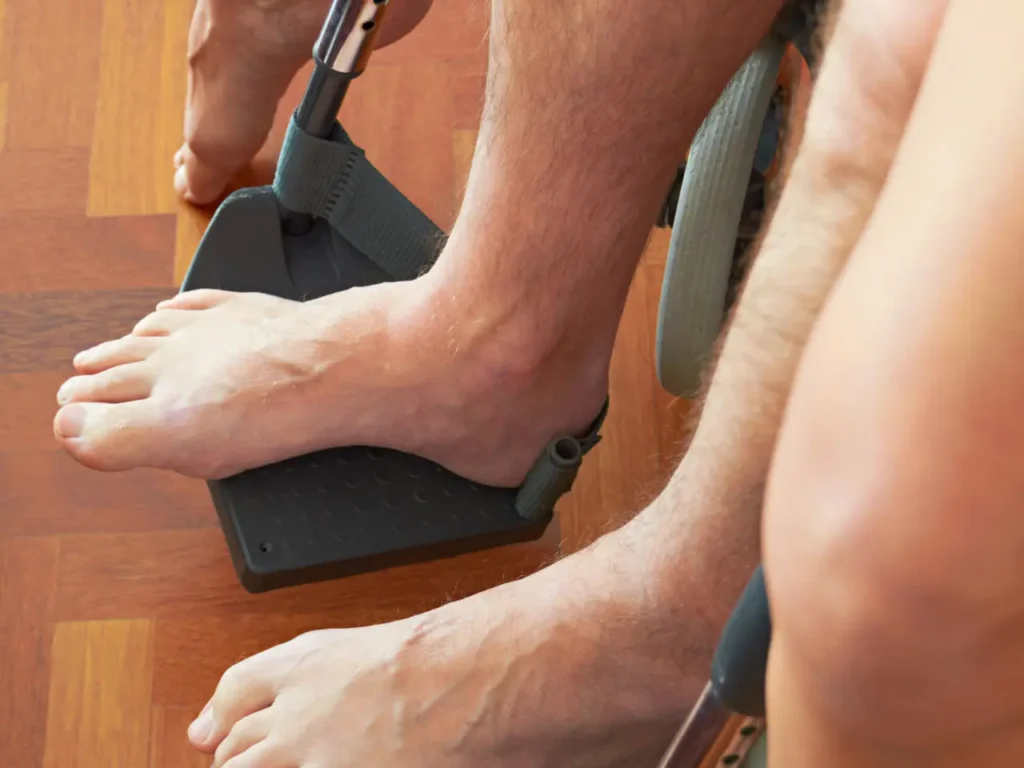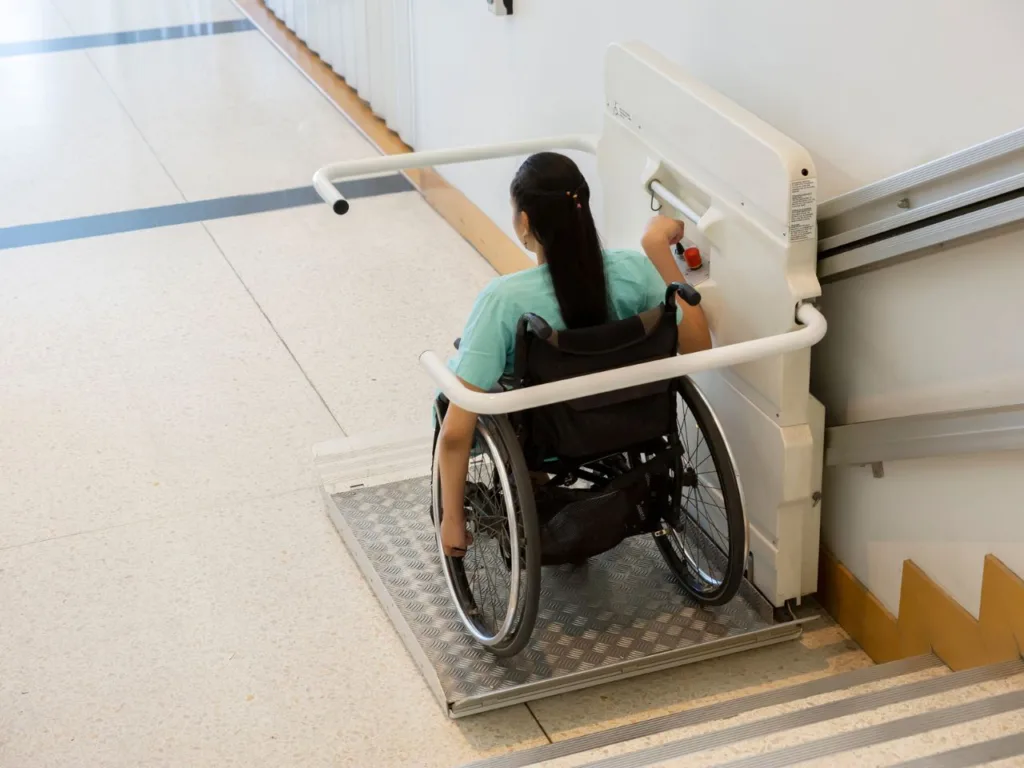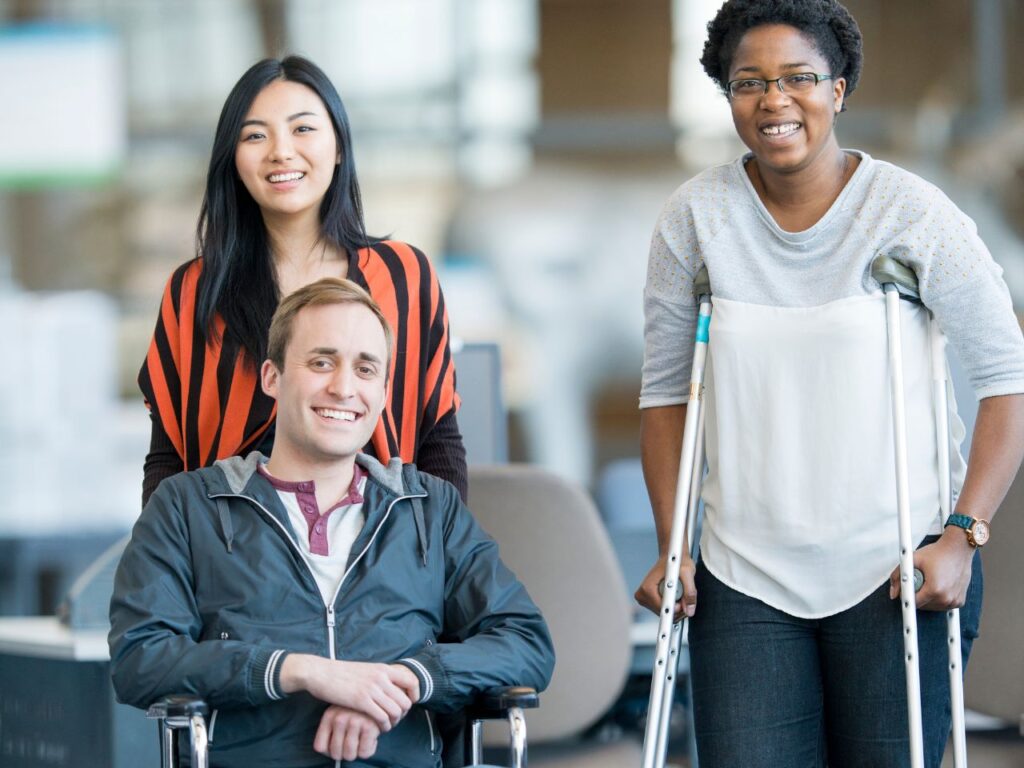Updated on November 7, 2024

Sexuality is a fundamental aspect of being human.
Unfortunately, conversations on sex for people living with disabilities are often downplayed or not spoken about enough. There are many misconceptions and stereotypes that can hinder open discussions about sex and intimacy.
This article looks to explore the intersection of disability and sex, dismiss common myths, and provide practical advice for embracing intimacy.
Understanding disability and sexuality
Sexuality is not solely about physical acts; it encompasses emotional, psychological, and social aspects of a person’s life.
Everyone, including people with disabilities, has the right to experience sexual pleasure, love, and intimacy. However, societal attitudes often overlook the sexual needs and desires of individuals with disabilities which can lead to isolation and misinformation.
Disability does not diminish sexual desire or capability. Just as people without disabilities have diverse sexual experiences, so do those with disabilities. It is important to understand that each person’s experience is unique, and generalizations can be harmful.
Common myths about disability and sex
Myth 1: People with disabilities are not interested in sex.
One of the most common myths is that people with disabilities are asexual or uninterested in sex. This is likely from the assumption that a disability somehow negates a person’s sexual desires. The reality is that people with disabilities have the same range of sexual interests and desires as anyone else. They seek emotional and physical connections and have the right to express their sexuality.
Myth 2: People with disabilities cannot have sex.
Physical or cognitive impairments do not automatically prevent someone from having a fulfilling sex life. Certain disabilities may require a different approach to sex but these do not eliminate the possibility of sexual activity. For instance, people with mobility issues can explore various positions, tools, or assistive devices to find what works best for them. Communication with partners is important in understanding what is needed and preferred.
Myth 3: People with disabilities should only date or marry other disabled people.
This myth suggests that people with disabilities are only compatible with others who have disabilities. While it’s true that shared experiences can create strong bonds, people with disabilities can and do have relationships with able-bodied partners. Relationships and exploring sexual intimacy should be based on mutual respect, love, and understanding, rather than the presence or absence of a disability.
Myth 4: People with cognitive disabilities cannot consent to sex.
Consent is an important aspect of any sexual relationship. The ability to give informed consent depends on a person’s understanding of the situation and the ability to make decisions. It is important not to assume that people with cognitive disabilities cannot provide consent. With the right support and education, many persons with cognitive impairments can make informed decisions about their sexual lives.
Myth 5: People with disabilities can’t experience sexual pleasure.
This myth incorrectly assumes that a disability automatically limits or eliminates a person’s ability to feel sexual pleasure. The truth is that sexual pleasure is not solely dependent on physical abilities; it also involves emotional, psychological, and sensory factors. Many people with disabilities are fully capable of experiencing and enjoying sexual pleasure. Depending on the nature of the disability, some may explore different ways to achieve satisfaction, such as experimenting with various forms of touch, positions, or assistive devices.
The importance of sexual education
Empowerment and autonomy
Sexual education provides people with disabilities the knowledge they need to make informed decisions about their bodies and relationships. By understanding their sexual rights and boundaries, they are empowered to exercise autonomy in their sexual lives. This education also helps them communicate their needs and desires better, promoting healthier and more respectful relationships.
Safety and consent
One of the most important aspects of sexual education is teaching about consent and personal safety. People with disabilities, especially those with cognitive or communication challenges, are at a higher risk of sexual abuse or exploitation. Comprehensive sexual education equips them with the tools to recognize inappropriate behaviour, assert their boundaries, and seek help when needed. It also educates them on how to give and receive consent, ensuring that their sexual experiences are consensual and respectful.
Addressing specific needs and challenges
Sexual education tailored to the specific needs and challenges faced by people with disabilities is essential for ensuring that they have accurate and relevant information. For example, persons with physical disabilities might need guidance on different techniques they can adapt for sexual activity, while those with cognitive disabilities might benefit from clear, simple explanations about consent and boundaries. Tailored sexual education ensures that everyone, regardless of their disability, receives the information they need to navigate their sexual lives safely.
Enhancing sexual health
Comprehensive sexual education includes key information about sexual health, such as safe sex practices, contraception, and the prevention of sexually transmitted infections (STIs). For people with disabilities, access to this information is particularly important, as they may face additional barriers in accessing healthcare services. Education empowers them to take control of their sexual health, make informed choices, and seek appropriate care when needed.
Promoting inclusion and equality
Providing sexual education to people with disabilities is a step towards greater social inclusion and equality. It recognizes their right to the same sexual knowledge and opportunities as everyone else, challenging the societal norms that often marginalize them. Inclusive sexual education promotes the idea that people with disabilities are sexual beings with the same rights, needs, and desires as anyone else which can help create a more equitable society.
Challenges with disability and sex
Societal stigma
People with disabilities often face societal misconceptions that can severely impact their sexual lives. One of the most damaging is the stereotype that they are asexual or uninterested in sex, which can lead to their exclusion from conversations about sexuality and intimate relationships. To add to this, there’s overprotectiveness from families and caregivers, who may restrict their opportunities to explore their sexuality out of fear or ignorance. People living with disabilities are not often represented as sexual beings in media This promotes the idea that they are not, or should not be, interested in sex, reinforcing harmful stigmas.
Lack of accessible sexual education
Sexual education for people with disabilities is often not enough. They have little to no access to important knowledge about their bodies, consent, and safe sex practices. Traditional sexual education programs tend to overlook the specific needs of disabled people which creates significant gaps in their understanding. Those with cognitive or communication disabilities have greater difficulty accessing and understanding sexual education due to communication barriers. There is generally a shortage of sexual education programs tailored to various disabilities, which can lead to misinformation and increase vulnerability to sexual abuse.
Physical and environmental barriers
Persons with physical disabilities may face unique challenges in their sexual lives due to mobility issues, which may require adaptations or assistive devices that are not always easily accessible or affordable. Healthcare services, including those related to sexual health, are also not often fully accessible, making it difficult for people with disabilities to receive the necessary care and guidance. Furthermore, there is limited access to tools and resources like sex toys designed specifically for people with disabilities. This makes it more difficult to comfortably explore their sexuality.
Consent and autonomy issues
Consent and autonomy are important aspects of any sexual relationship, but people with disabilities may face significant challenges in these areas. Persons with cognitive disabilities, for example, may struggle to understand and communicate consent, which can make them more vulnerable to exploitation or abuse. Moreover, there is often a lack of respect for the autonomy of people with disabilities in making decisions about their sexual lives, with others assuming they are incapable of making good choices.
Healthcare and sexual health concerns
People with disabilities often encounter significant challenges in accessing sexual health information and services. They may not receive adequate information about sexual health, contraception, or the prevention of sexually transmitted infections (STIs) due to biases or a lack of training among healthcare providers. Additionally, regular sexual health screenings and preventative care can be difficult to obtain because of physical barriers in healthcare settings or assumptions that people with disabilities are not sexually active, leading to inadequate care.
Navigating disability and sex
Open communication
Communication is key in any relationship, but it becomes even more important when navigating disability and sex. Discussing needs, desires, and boundaries openly with a partner helps create a comfortable and understanding environment. This can include talking about physical limitations, preferred positions, or the use of assistive devices that can enhance the sexual experience. It’s also important to address any concerns or fears related to intimacy. Partners should feel comfortable asking questions and expressing their thoughts to build trust and intimacy.
Education and Awareness
Understanding how disability might impact sexual experiences is important to put things into perspective. Seek out sexual education resources that are tailored to your specific needs. This might include talking to a healthcare provider, attending workshops, or reading materials designed for people with disabilities. Learning about your body and how it responds helps you explore and enjoy sex more fully. This includes understanding how your disability may affect your sexual function and what changes might be helpful.
Adaptation and creativity
Depending on the type of disability, certain modifications may be necessary to have sex comfortably. This could involve experimenting with different positions, using pillows or supports, or finding alternative ways to experience pleasure. There are various assistive devices and adaptive tools available that can enhance sexual experiences for people with disabilities. These can be anything from specialized sex toys, and positioning aids, to lubricants designed for specific needs. Sexual intimacy isn’t limited to traditional intercourse. Exploring different forms of intimacy, such as oral sex, mutual masturbation, or sensual touch, can be satisfying alternatives or complements to penetrative sex.
Prioritize emotional intimacy
Building a strong emotional connection with your partner can greatly improve physical intimacy. Emotional intimacy involves sharing feelings, fears, and vulnerabilities, which can lead to a deeper, more satisfying sexual relationship. If you or your partner have concerns or anxieties about sex, it can be helpful to take things slowly. Gradually building up to more intimate activities allows both partners to feel more comfortable and confident.
Consult healthcare professionals
A sex therapist who is knowledgeable about disabilities can provide guidance and strategies for navigating sexual issues. They can help address any psychological barriers, offer advice on adaptive techniques, and suggest ways to enhance sexual pleasure. For those with disabilities that affect sexual function, consulting a doctor can be beneficial. Healthcare professionals can offer advice on managing physical challenges, suggest treatments or therapies, and provide information on safe sex practices you can implement.
Focus on consent and respect
Consent is the bedrock of any healthy sexual relationship. It’s important to ensure that both partners fully understand and agree to what’s happening. This is especially important when there are communication barriers or cognitive disabilities involved. Respecting each other’s boundaries and comfort levels is an important part of a positive sexual experience. This means being attentive to verbal and non-verbal cues and being willing to stop or adjust if something isn’t working.
Explore sexual health and wellness
Staying on top of sexual health is important for everyone. Regular check-ups with a healthcare provider can help ensure that any issues are addressed early and that you have the information you need to stay healthy. Some disabilities or their treatments can affect sexual function or desire. If this is an issue, discuss it with your doctor, who may be able to adjust your treatment or suggest alternatives to help manage side effects.
Build a supportive community
Community is always important. Engaging with other people with similar experiences can provide emotional support and advice. Support groups, either in person or online, can be a safe space to discuss challenges and share tips for navigating sex and disability. Also, educating your partner about your disability and how it impacts your sexuality can help you have a more understanding and supportive relationship, where they are more empathetic and responsive to your needs.
Practice patience and compassion
Navigating disability and sex is not straightforward. It often involves some trial and error. It’s important to be patient both with yourself and with your partner as you explore what works best for you. It’s normal to experience frustration or self-doubt when facing challenges related to disability and sex. Practice self-compassion and remind yourself that it’s okay to take time to figure things out. This can help maintain a positive mindset.
Embrace a positive sexual identity
Everyone should feel empowered to embrace their sexuality as an important part of who they are, regardless of disability. Celebrate your body and your right to a fulfilling sexual life. Also, don’t accept opinions that don’t define you. Reject societal stereotypes that suggest people with disabilities are not sexual beings. Embrace and express your sexual identity confidently, knowing that you deserve a satisfying sexual experience.
Conclusion
Disability and sex are topics that need more open discussion to challenge the myths and misconceptions that have long surrounded them. Everyone has the right to a fulfilling sexual life without stigma. Creating awareness and being open-minded will help to create a world where sexuality is celebrated as a fundamental aspect of the human experience. Breaking down barriers and embracing diversity in sexuality not only enriches the lives of people with disabilities but also contributes to a more inclusive society where everyone’s needs and desires are respected and valued.
MORE FROM CENTRE DISABILITY SUPPORT
STATISTICS ON DISABILITY IN AUSTRALIA
The Right Way To Refer To People With Disability
Top 100 Weirdest Phobias and Their Meanings
What Does Fitness And Exercise Look Like For People With Disabilities?



